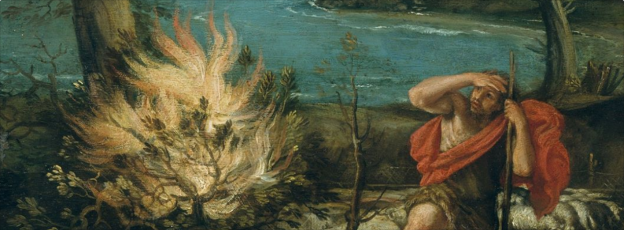Summary
Throughout history, when God has chosen to speak to the world through men, he has sometimes chosen to send signs and wonders to authenticate the message. Moses was a part of this pattern; not only did Moses receive a powerful call to the Ministry through the Burning Bush, but he was given powerful signs as well.
Despite the powerful signs God gave Moses to perform, he still shows extreme reluctance to return to Egypt. In this passage, we see God provide Moses with those signs, and also with a spokesman to speak for him. We see God’s mercy and provision despite Moses’ disobedience to his calling.
Our passage explained
v1
Still before God’s presence at the Burning Bush, in the opening verses of chapter four, Moses receives powerful signs to perform. Moses twice objected to his calling, doubting his worthiness to act as God’s servant (Exodus 3:11-12), and that the Israelites will believe God sent him and can deliver them from slavery (Exodus 3:13-15).
Moses’ third objection strings from his second: while God has stated the Elders of Israel will acknowledge Moses’ leadership (Exodus 3:16-21), Moses does not believe that the Israelites, in general, will believe him (v.1). They will hear his message and respond to him that “The LORD did not appear to you” (v.1).
v2-9
To this objection, God provides Moses with three powerful signs that will conclusively demonstrate he is God’s servant. First, God causes Moses’ shepherd staff to turn into a serpent (vv.2-3), clearly an act of God’s power which would get the attention of the Israelites (v.5). More so, because Moses is to (dangerously) pick the snake up by the tail, not the neck, to turn it back into a staff (v.4).
The second sign shows God’s power beyond physical objects to humanity itself: Moses’ hand is turned “leprous” (likely a skin disease rather than leprosy) when he places it in his cloak, and restored when he repeats the trick (vv.6-7). This sign would be instantly alarming (as it was to Moses), and shows God has power over life to hurt and to heal.
The third sign, if the Israelites still will not listen, is “the water that you shall take from the Nile will become blood on the dry ground” (vv.8-9). The Nile was the sacred source of life in Egypt, and so turning water from the Nile to blood demonstrates God’s power over life and death, despite what the Egyptian “gods” may claim about their own life-giving powers through the Nile waters.
v10-17
Despite these powerful signs, Moses still objects to his calling, so God gives him a spokesman. Moses states he is “not eloquent … slow of speech and of tongue” (v.10). In effect, Moses complains that he is not up to the job and God has not done anything to help his public speaking skills.
God objects to this argument as irrelevant, since God “made man’s mouth” and determines who can speak how well (v.12). He commands Moses to “go” because God “will be with your mouth and teach you what you shall speak” (v.13).
Moses then becomes disobedient, asking God to send someone else (v.13). God’s anger at sinful disobedience is kindled, but despite this God has graciously sent Moses’ brother Aaron to meet him, because God knows Moses’ heart (v.14). Aaron will act as Moses’ spokesman, just as Moses speaks on behalf of God (vv.15-16). They will speak the words God gives them, not their own words.
Finally, God tells Moses to take his staff “with which you shall do the signs” (v.17). Moses and Aaron will take on a mighty empire with nothing in hand but a shepherd’s staff. But they will have God’s words, and his powerful signs to accompany them in the task. They go in God’s strength, not their own.
Our passage applied
Just as Moses went to Egypt with powerful signs that demonstrated God’s presence with him, so too Jesus’ ministry was accompanied by powerful signs. When John the Baptist’s disciples came to see if Jesus was the Messiah, he replied: “the blind receive their sight and the lame walk, lepers are cleansed and the deaf hear, and the dead are raised up, and the poor have good news preached to them” (Matthew 11:4-5). God’s powerful signs demonstrated Jesus was the promised Messiah, come to rescue us from slavery to our sins.
Thankfully Christ did not try to run away from his calling. At Gethsemane on the night he was betrayed, Jesus prayed to God for strength and humbly submitted to God’s will, even though he wished there might be another way. Where Moses disobeyed God, Jesus was humble and obedient all his days, all the way to the Cross. It is through Christ’s righteousness and his sacrifice we are rescued from slavery to sin.
We rely on God’s strength to win our battle against sin. Like Moses and Aaron, we have no power of our own but God’s words given to us in Scripture, and the powerful signs performed by God through Jesus. His strength, not ours.
Resources
Questions? Please contact us. Inspired? Come and worship with us on Sundays.


